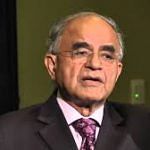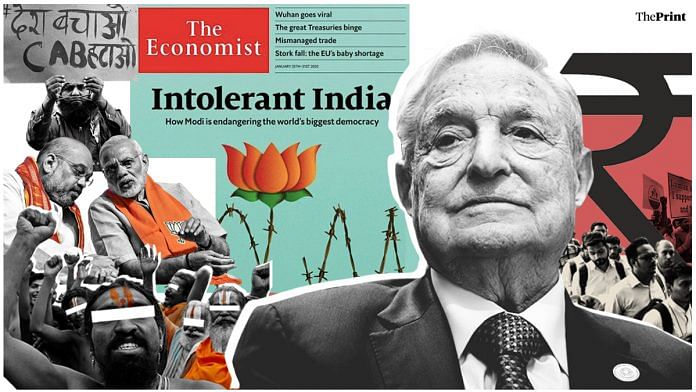Billionaire philanthropist George Soros criticised Prime Minister Narendra Modi at the World Economic Forum in Davos saying he was creating a “Hindu nationalist state”, imposing restrictions in Kashmir and “threatening to deprive millions of Muslims of their citizenship”. The Economist, a British magazine, has also criticised the Modi government in its latest cover story titled ‘Intolerant India’.
ThePrint asks: Economist, Soros: Has Hindu nationalism increased global criticism of India or bad economy?
1% economic growth brings happiness to 3 crore people. So, India can’t afford to disregard Soros, Bezos, Nadella
 Gurcharan Das
Gurcharan Das
Author and former CEO of Procter & Gamble India
India is making unfortunate headlines abroad for two reasons: Hindu nationalism and the serious slowdown of the economy. It is certainly legitimate for a large investor like George Soros to comment on both India’s politics and economics because they are related. If politics creates unrest and poses a challenge to law and order, then investments are at risk. I do not believe we are at that point right now but our Hindutva politics are certainly a distraction.
PM Modi must pay heed to Soros, Satya Nadella, and Nobel Laureates Abhijit Banerjee and Venkatraman Ramakrishnan, and all those who have expressed concern about the rise of religious polarisation in India. Nadella is right in saying India cannot hope to be an IT powerhouse without an open immigration policy. I was truly sad when Commerce Minister Piyush Goyal’s dismissed Amazon CEO Jeff Bezos’ pledge to invest $1 billion in India and create jobs. This is exactly the opposite of how China treats foreign investors.
If India wants to become a $5-trillion economy, it requires a single-minded focus. Too much negative energy is being generated on issues like Kashmir, the CAA-NRC. We are at a 5 per cent growth rate and we have to climb up to 8 per cent if we want to achieve the goal. And these are not just numbers: a 1 per cent increase in economic growth brings 15 lakh jobs, with each job creating three indirect jobs, which each in turn supports five people. So, 1 per cent growth brings happiness to three crore people.
Any sign of unwillingness to engage with people not in favour of India hurts our global image
 Robinder Nath Sachdev
Robinder Nath Sachdev
President, The Imagindia Institute
India’s image among international powers has taken a downturn due to a combination of Hindu nationalism and the state of the economy, but I feel the latter holds more weight. This is because the international order has always been more favourable towards stable economies.
India definitely needs to improve its communication with the rest of the world, which requires increasing the strength of its diplomatic core. There are about 800-900 diplomats in the Indian foreign office as compared to about 14,000 people in the US State Department.
External Affairs Minister S. Jaishankar’s decision to not meet US legislator Pramila Jayapal was probably due to some hiccup. But it broadly shows we are not willing to engage with people who are not in favour of India. This, in turn, hurts our global image. If sensitive political issues like the situation in Kashmir are left unaddressed, critical voices will only grow louder. It is the duty of the MEA to act quickly and respond efficiently to these voices and uphold India’s sovereignty.
India must avoid the image-trap that China finds itself in. Some of the problems that Beijing faces today are due to its negative image in the world.
It also wouldn’t be a bad idea for Prime Minister Narendra Modi to use Twitter to be more vocal on international relations. However, this must be done in a nuanced manner and he must be carefully advised by the MEA.
If the Indian economy was doing well, socio-political issues would go fairly unnoticed
 Dilip Cherian
Dilip Cherian
Communications consultant, political campaign adviser
If the Indian economy was doing well, the vast socio-political issues would go fairly unnoticed. If you look at George Soros’ full statement, he has critiqued other economies as well and their trivial politics. There is an unexplored area with regard to the relationship between these two factors. It makes me wonder – does political unrest result in economic distress or is economic distress a catchment area for political unrest? It’s an especially important question in the context of India. Is mass unemployment forcing people out on the streets to protest or is it the other way around?
When global economic icons such as Jeff Bezos or Soros make statements like this, they cannot be ignored because their impact is far wider than just the companies they own.
Today, topics like this are discussed in boardrooms, and if India cares about the boardrooms that consider FDI within its borders, then the image of the Narendra Modi government becomes all the more critical. Not to mention, the Indian economy has become increasingly dependent on foreign capital ever since domestic savings have declined.
Dismay of experts like Soros reflects the sordid reality about what’s happening in India, socially and economically
 Rohit Chopra
Rohit Chopra
Associate professor, Santa Clara University, US
The Narendra Modi government has suddenly come under a spate of criticism from global media and in international forums. While the coverage has been centered on the Modi government’s discriminatory policies as well as the shabby state of the Indian economy, it is the former that has drawn sharper condemnation.
This is in part because, for all its imperfections and inconsistencies, India has been a rare country among postcolonial states in sustaining a largely stable, secular democracy. But the country’s very foundations are now under threat with the CAA-NRC. Kashmir has been turned into a prison. India led the world in Internet shutdowns in 2018 and 2019.
The disastrous economic policies of the Modi government, like demonetisation, have been rightly criticised. An India that flounders economically will affect the global economy. But the economy is not separate from the domains of society and culture. Some degree of social stability, well-functioning institutions, transparency, and freedom of expression are, arguably, necessary, if not sufficient, conditions for the economy to chug along if not gallop.
A state that is focussed on humiliating and excluding the country’s minorities, that destroys educational institutions, rewards cronies, and viciously attacks critics will not be able to provide stability in any form. The dismay of experts like George Soros – given his commitment to both the idea of an open society and free market – at what is happening in India reflects this sordid reality.
Also read: Has IMF’s Gita Gopinath made India a convenient scapegoat by blaming it for global slowdown?
By Pia Krishnankutty, journalist at ThePrint




Very interesting and some pragmatic views. Focus on economic growth. Only let those immigrants in that help the economy like the western countries do. Have a strict but fair refugee policy and stop letting in unskilled labor. India is not short of that kind of labor.
We should stop making a drama out of every change – bad political strategy for all parties. Focus people’s attention on country’s progress so that the youth are spending their time productively. These protests indicate there is a sense of pessimism in the youth and they are latching on to any reason to come on the streets. The government’s and oppositions focus should be on economic progress. Look at China, they are clever.
Stop the drama and start some pragmatic problem solving!
Did you librandu media ever criticised islamic terrorism that have engulfed whole world and also have put chaos in kashmir and made kashmir terror state.
Stop whataboutism. Everybody has criticised Islamic terrorism. Don’t try to bring up unrelated issues and instead talk about the economy and what the pm is doing about it. He wastes money on foreign tours, unnecessary statues and has also increased corruption by weakening the RTI act.
Open emigration policy does not mean allowing terrorists to infiltrate in large numbers.this people dont have to face terrorist bullets as they sit in their air conditioned cabins & preach sermons.
Do you face bullets? How many years have you served in the military. If our military does face a lot of bullets, why has Modi cut the military budget?
It is enlightening to read next to the article “It’s The Economist, stupid. Indian democracy under Modi is too strong to slip on flawed index” the talk point of the Print.
Obviously the Hindu nationalism. So many countries have bad economy, who criticizes them?
Government should now do two things. First, declare that it will stay implementation of the CAA till the national consensus emerges and it is open to suggestions for amending the provisions in the Act. Second, it should stop proxy management of the economy by the PMO and induct a reputed economist/ expert equivalent to the stature of Manmohan Singh as the Finance Minister.
ok then economist likes whom..now not even US. I have been following economist since 2004 and it never had anything good to say about India. Infact the sphere of dislike of these liberal publications have only increased to likable being only limited to everything white, Christian and anglo sason only. Infact economist treats Scandinavian countries as tree hugging free loader as they are not anglo sason. They are unchallanged as keeper of liberal thought is really sad affair in 2020. The only anology is that of UK royal house as keeper of freedom and inclusion when it cannot integrate girls from common household. With Queen in office who needs skinheads on street.
Great point, Aditya! I have reading the Economist since the early 2000s too. When has ever been pro India? They have their own agenda….to be taken with a pinch of salt.
You are absolutely spot on about their unique Englishness! They do constantly criticize the Continentals. The UK is having precisely the same Nationalistic issues today and for a good reason. Along with its value, Globalism has its weaknesses and they are evident in the UK.
Why do Indians get so excited about a critical Economist cover? Just stop focusing on emotive issues and the perpetual eco chamber and start focusing on nation building. Everyone will shut up with the sound of £s and $s.
Indian elite and wannabe elite(urban, upper middle class) really need to give up this habit of seeking approval of the rich, white guys.
They will invest in India for economic reasons, for our market size not coz of our democracy. Even Japan is still considered a flawed democracy by western standards. Stop comparing India with West everytime.
China has had 3 decades of strong economic growth without democracy, nobody said a word against them, even today global leftist elite doesn’t condemn China like they condemn India, why? Coz China doesn’t bother about them.
Great point and you are absolutely correct!
I just disagree with this comment, however gender insensitive it may be
Avatarashok
24 January, 2020 at 5:29 pm
At the moment one feels like the child that has inherited George Bernard Shaw’s looks and his lovely actress friend’s intellect.
Indians cannot handle any criticism and thus can’t make any changes that will improve them.
Whatever the faults of China, it’s economy, infrastructure, schools, planning are top notch. India meanwhile relies on Hindu fascism and its oversized ego to tell how successful it is. That method is dead.
What are you doing in Hindu fascist India when a Pak land is allotted to you, the pure and secular?
If you and all know this, how come the dumb occupy the North and south block.in Delhi???
The one you say dumb occupying the North and south block.in Delhi is smarter than those who call him dumb.
Who cares about this foreigners. We are not their political puppet but an independent country.
At the moment one feels like the child that has inherited George Bernard Shaw’s looks and his lovely actress friend’s intellect.